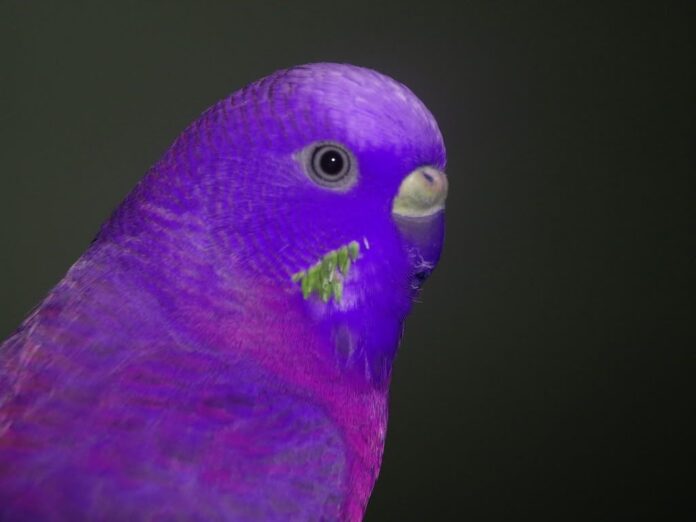Last Updated on August 14, 2021 by Fumipets
Purple parakeets are stunning birds. They look a lot like parrots, but there is a lot more to learn about them. They need proper care, which includes knowing what to feed them, how much exercise they require, and a variety of other factors.
What are some things to consider when purchasing a purple parakeet? Purple parakeets have a unique colour due to their widespread breeding. They’re excellent pets since they’re low-maintenance and don’t cost as much to feed. They like social interactions with their owners and should be given a diet of seeds, veggies, fruit, and pellets from your local pet shop.
It is difficult to know everything about a purple parakeet. They should not be treated as lesser creatures just because they are tiny. Purple parakeets are just as precious as parrots, and if you’re thinking about getting one, here’s everything you need to know.
Origin
Parakeets are indigenous to Australia, where they may still be seen in large flocks on the grasslands to this day!
In 1838, a man called John Gould introduced a “budgie” (as parakeets are affectionately known) to Europe, where it quickly became a popular pet. Australia declared it illegal to export budgies in 1894, which led to budgie breeding becoming a big industry.
The parakeet eventually made its way to America, where it remained as popular as ever in the 1950s. They may now be found in most pet shops since they are a smaller, low-maintenance breed.

Abundance of Colors
The purple colour of a purple parakeet is the result of prolonged breeding. When selecting budgies to breed from, a breeder becomes very picky. The reason for this is because they are attempting to create a particular hue.
Parakeets may be found in a variety of colours, including neon green, violet, blue, yellow, pied, and albino!
Markings
The presence of bar marks across the parakeet’s forehead is common. These marks will fade as they get older, and their black irises will ultimately become grey.
Purple Parakeets as Pets
Parakeets, commonly known as budgies, may be the ideal pet for a wide range of individuals. They are one of the most popular and widely owned pets in the planet.
Because parakeets are tiny, they are simple to care for. If you like having tiny pets, parakeets are likely to be a good match for you.
Not only are parakeets tiny (making them simple to look after and maintain in your apartment or condo), but they’re also easy to clean up after.
Most people feel that having a parakeet is less expensive since they don’t consume as much as bigger birds and you don’t have to spend as much money on a large cage to keep them in.
One minor disadvantage of this species is that it may require frequent cleaning around the perimeter of its cage.
They have a habit of throwing their food or seed about their cage, and some of it ends up outside.
Temperament
A (purple) parakeet’s disposition is quite friendly. When they are treated with kindness and respect, they are loving and affectionate animals.
They like being free to explore their environment and interact with other birds of their size and species.
They thrive on time spent with their owners since they are loving animals. In fact, they anticipate the social time they will have with their caregivers.
You will need plenty of time to connect with your purple parakeet in their natural habitat if you want to establish a strong relationship with them.
You should also maintain them as the lone bird in their cage since parakeets may lose interest in people if they are often surrounded by other parakeets.
Because parakeets are clever creatures, they can be trained to perform some really amazing things. They can be trained to whistle and even “talk” in certain cases.
Despite their little size, they have enormous brains and are capable of being as clever as bigger birds.
They may be the most wonderful addition to your life (and to your family if you have one) provided you give them the appropriate training. They’re full of personality and brimming with a sense of fun.
These animals may form bonds with you as if you were a close friend (you can reach that with quality time spent with them).
Nutrition
Parakeets do not survive only on seeds, contrary to common assumption. They really need more nourishment in order to maintain a healthy lifestyle and live a long life.
If you visit your local veterinarian, they may advise you to feed your parakeet a diet that includes a variety of veggies as well as pellets.
Pellets may provide essential vitamins and other nutrients that they may not be able to get from a seed diet alone.
Purple parakeets may be fed fresh fruit, leafy greens, root vegetables, and grains in addition to veggies and pellets.
It’s important to remember that just because parakeets can handle seed better than other animals doesn’t imply it should be their only source of nutrition.
It’s hazardous to feed your parakeet an all-seed diet since it may kill them.
Lifespan
If kept captive and cared for in a household, a purple parakeet may live for seven to fifteen years. Some people may survive up to 20 years if they are given near-perfect care.
However, since most parakeets may succumb to diseases or be killed in accidents, the average lifetime seems to be 7 years.

Health
Parakeets are prone to the same diseases and health problems as parrots. However, there are certain instances that are exclusive to the parakeet.
They may develop goitres as a result of an iodine shortage.
They may develop tumours and possibly get Psittacosis if they are given a seed diet (also known as parrot fever).
Scaly mites, which may damage the skin on your parakeet’s legs and around their eyes, should also be avoided.
If your beloved pet becomes sick with any of these diseases, take him or her to your local veterinarian right once for treatment.
Size
Parakeets (budgies) may reach a length of 7 to 9 3/8 inches from the tip of their beak to the tip of their tail.
Exercise
Free flight is one of the most effective ways for a parakeet to get some exercise. It is essential for them to be allowed to fly freely for at least a few hours each day.
When you do have a free-flying period put in place, make sure the space is clear of any possibly hazardous or dangerous items.
A big house plant that may serve as their own playground is a wonderful way for your parakeet to enjoy their time spent outside of the cage.
If your parakeet isn’t getting enough free flight time, consider putting some toys in their cage. They can keep themselves occupied throughout the day if they are provided with some stimulus.
Changing up the toys every couple of months will keep them from becoming bored.

Related Questions
Do Purple Parakeets get lonely?
Your parakeet may get lonely if you are away from home for more than a few hours each day. They are very sociable animals that seek love from their owners. Consider getting them a second parakeet to keep them company.
Are Parakeets good pets?
If you’re looking for a pet that’s simple to maintain and care for, a parakeet is an excellent choice. They are also little, which means they are less costly to feed and are really sociable animals.
Do Purple Parakeets bite you?
Actually, a parakeet can bite you. While their beaks are tiny, their bites are powerful. When dealing with them, take sure to treat them with respect and have a cool demeanour. If you do this, you will have a lower risk of being bitten.


















